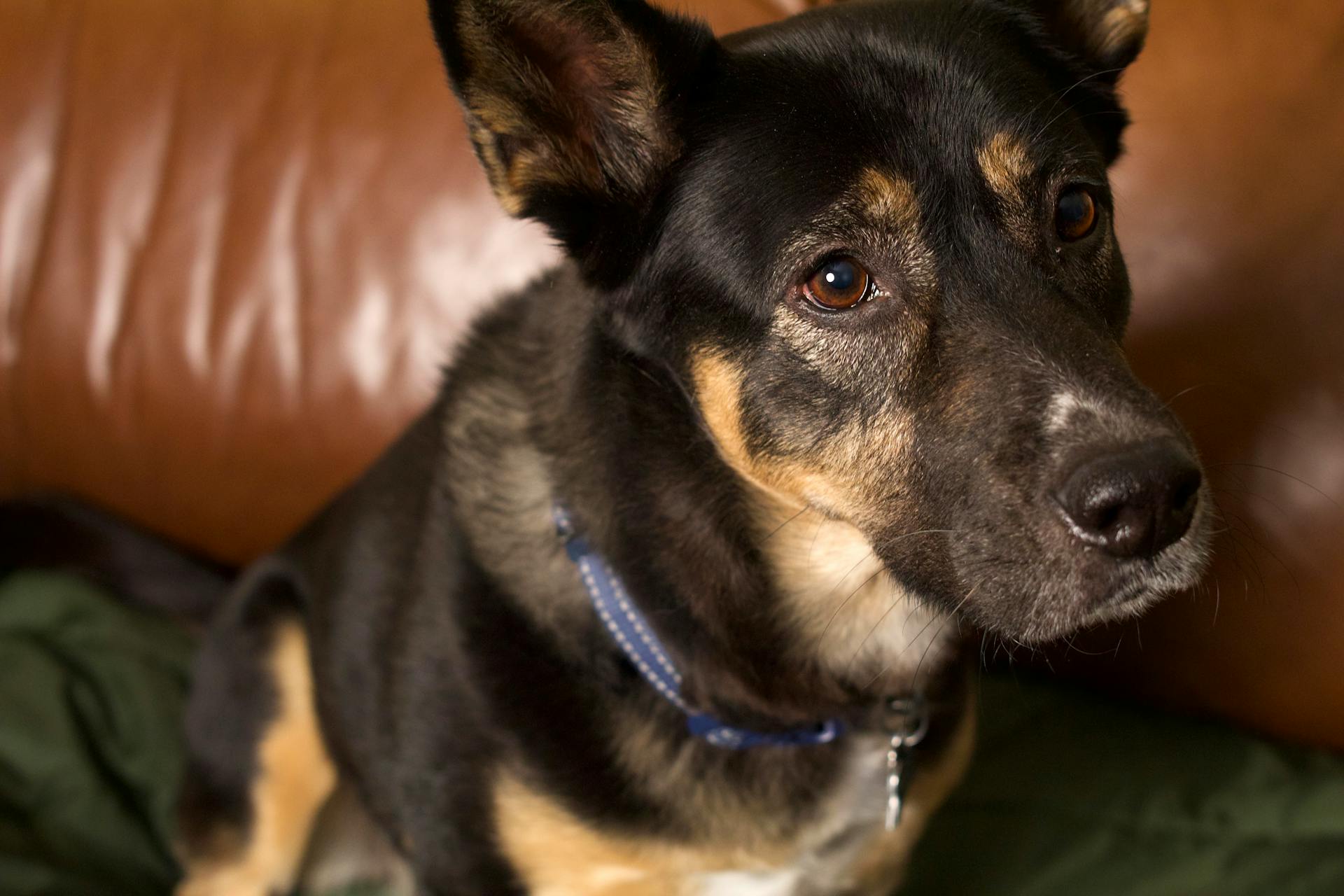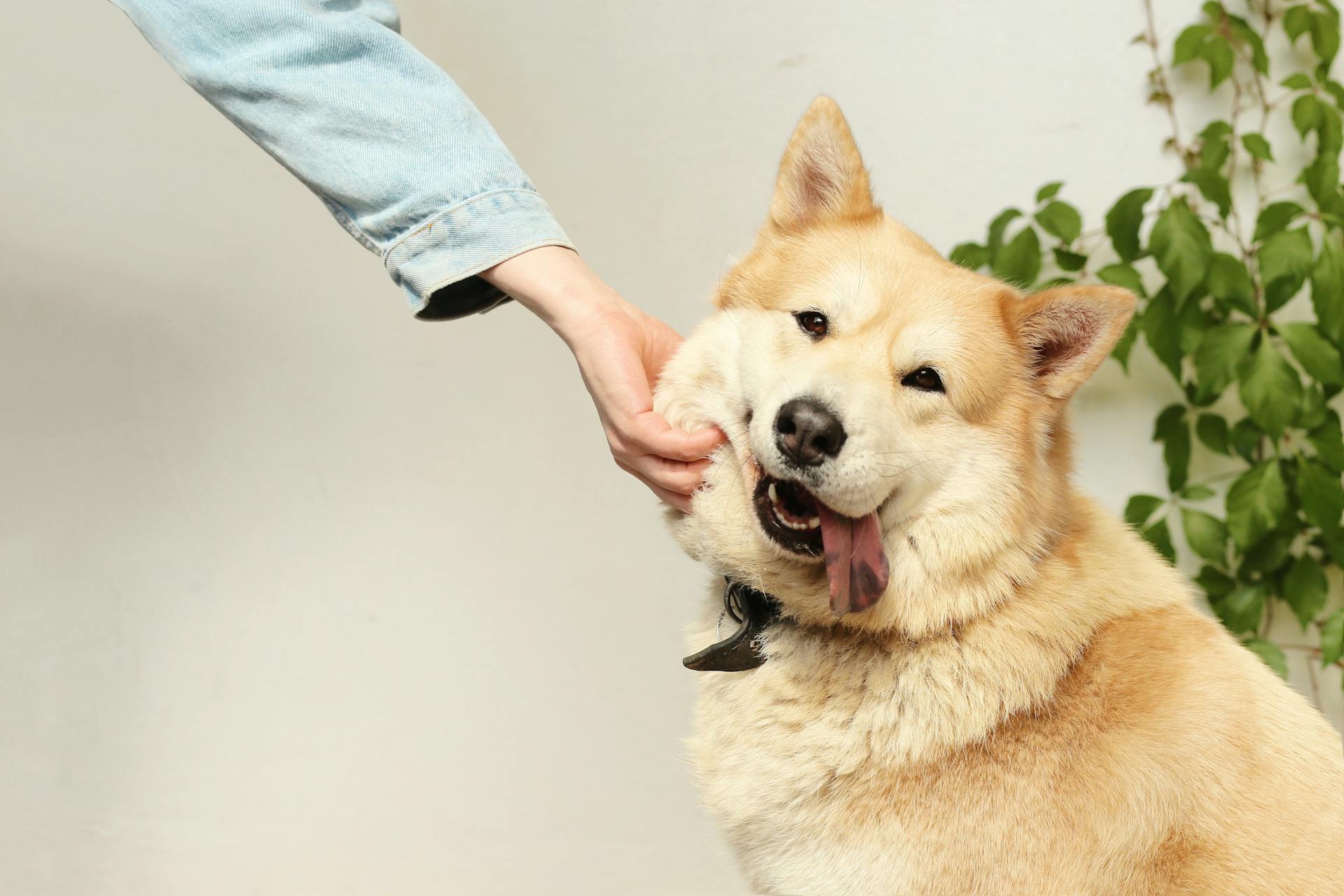
The Bernedoodle breed is a cross between a Bernese Mountain Dog and a Poodle, typically a Standard Poodle. This unique combination creates a loving and intelligent companion.
Bernedoodles are generally easy to train due to their high intelligence and willingness to please. They thrive on positive reinforcement and consistent communication.
Bernedoodles require regular grooming to prevent matting and tangling of their fur. They need to be brushed several times a week, and their coats should be trimmed every 6-8 weeks.
With proper care and attention, Bernedoodles can live up to 12-15 years, making them a long-term companion for many families.
Intriguing read: Bernedoodles and Goldendoodles
Temperament & Intelligence
The Bernedoodle breed is known for its friendly and outgoing temperament, making it a great family dog.
They are intelligent and trainable, thanks to their Poodle parent's genes, and excel at learning new commands and tricks.
However, they can inherit the Bernese Mountain Dog's stubbornness, making them slightly more challenging to train during their teenage years.
Consistent training and positive reinforcement can help overcome this challenge.
Bernedoodles are highly energetic and require at least 60 minutes of exercise and playtime each day to prevent boredom and destructive behavior.
They are also highly intelligent and need mental stimulation, such as brain games, to keep them engaged and happy.
Bernedoodles are naturally social and friendly with strangers, but they can become overprotective if not properly socialized.
They thrive on attention and affection from their family, making them a great companion dog.
However, they can be sensitive and skittish around new people, so early socialization is crucial.
With proper training and socialization, Bernedoodles can become well-behaved therapy dogs or excellent companion dogs.
Their intelligence and trainability make them a joy to work with, but they can also be prone to hyperactivity, anxiety, and excessive barking if not properly managed.
Positive reinforcement training and early socialization can help address these potential issues before they become bigger problems.
Expand your knowledge: Bernedoodle Potty Training
Puppies
The Bernedoodle is a friendly and playful breed, making it a great choice for families with children.
It's essential to find a reputable breeder who has done the necessary screening on the parents for conditions like joint dysplasia.
You should ask to meet the puppy at least once, and also meet one or both parent dogs to get a sense of their character.
A well-behaved mom is a good indicator of a well-behaved puppy, as young puppies take early social cues from their parents.
You can also find Bernedoodle puppies in shelters, but it's still crucial to take the same precautions as when buying from a breeder.
Meeting the puppy and its parents can give you valuable insights into the puppy's personality and temperament.
Pet and Child Friendly?
The Bernedoodle breed is known for being gentle and loving, making them a great addition to families with young children. They can withstand rough play from small children, which is a big plus for families.

Bernedoodles are intelligent and eager to please, but they do require some early training to prevent injury. Consistent and fair training will help your Bernedoodle learn quickly.
Introducing your Bernedoodle to other pets, especially when they're young, is crucial for a harmonious household. They generally get along with other dogs and cats, but it's essential to supervise first introductions and teach children proper dog handling.
Supervise interactions between your Bernedoodle and smaller animals, as they may be distracted by fast and small pets. Early socialization is vital to prevent fear or aggression in your Bernedoodle.
Bernedoodles are known to make fast friends with other pets, and their non-aggressive tendencies make them a great addition to multi-pet households.
You might enjoy: Bernedoodle Training Guide
Pet Compatibility
Bernedoodles are generally great with other pets, but it's essential to introduce them at a young age to ensure a happy relationship. They tend to get along well with other dogs and cats if socialized properly.

You should never leave a Bernedoodle alone with smaller animals, as their Poodle heritage may cause them to chase fast and small creatures. This doesn't mean they're naturally aggressive, but it's better to err on the side of caution.
Early socialization is key to preventing fear or aggression in Bernedoodles, so make sure to introduce them to other pets and animals at a young age. This will help them develop positive relationships and avoid any potential issues.
Bernedoodles are also great with kids, being gentle enough for young children but sturdy enough to handle a little horseplay. Supervise first introductions and teach children proper dog handling to avoid any accidents.
Living in a multi-pet household? Don't worry, Bernedoodles are known to make fast friends with dogs and cats. Their non-aggressive tendencies make them a great addition to any family with multiple pets.
Here's an interesting read: Fast Dogs Breeds
Grooming the Coat
Your Bernedoodle's coat is one of its most distinctive features, and with the right care, it can remain beautiful and healthy.
The Bernedoodle's coat is low-shedding, just like its Poodle parent, but this also means it's prone to matting if not brushed regularly.
Brush your Bernedoodle at least twice a week to prevent matting and tangles.
You should also have your Bernedoodle professionally groomed every 3 months to keep its coat looking its best.
Trimming your Bernedoodle's claws every 2 or 3 months and brushing their teeth at least twice a week will also help keep them healthy and clean.
Don't forget to factor in the cost of regular grooming sessions, which can range from $100 or more every few months.
With a little effort, your Bernedoodle's coat will remain adorable and mat-free, and you'll have a happy and healthy furry friend.
For more insights, see: Flat Coat Doodle
Health
Bernedoodles are generally a healthy breed, but like any dog, they can be prone to certain health issues. Bernedoodles may inherit hip and elbow dysplasia, which can be worsened by over-exercising in puppyhood.
Hip and elbow dysplasia is a common concern with large breeds, characterized by abnormal joint development that causes pain and lameness. Thankfully, it can be corrected with medication or surgery if necessary.
Eye problems and skin issues, including hot spots, are also common issues for Bernedoodles. Hot spots are primarily caused by excessive licking or chewing of an area, often due to a dirty and matted coat.
To minimize the risk of skin issues, regular grooming is essential. A Bernedoodle is more likely to pick at their skin when their coat is dirty and matted.
The average lifespan of a Bernedoodle is 12-18 years, but they may be predisposed to certain health risks, including hip dysplasia, elbow dysplasia, ocular diseases, and some allergies.
Check this out: Bernedoodle Health Issues
General Health
Bernedoodles are generally a healthy breed, but as with any hybrid breed, their health can vary depending on their parents. Their size can also impact their health, with larger Bernedoodles potentially being more prone to joint issues.
Check this out: Mini Bernedoodle Health Issues

Standard Bernedoodles, which can weigh up to 100 pounds, may need more exercise and attention to prevent weight gain and joint problems. Miniature Bernedoodles, which weigh up to 55 pounds, may be more suitable for owners who want a smaller, easier-to-care-for pet.
Tiny Bernedoodles, the smallest of the three sizes, can weigh up to 25 pounds and may be a great option for apartment living. They still require regular exercise and attention, but their smaller size can make them a great choice for owners with limited space.
As with any breed, Bernedoodles can be prone to certain health issues, but their size and hybrid nature make them a relatively low-maintenance pet.
Readers also liked: Great Bernedoodle
How Long Do They Live?
You can expect your Bernedoodle to live a long and healthy life, with a lifespan of 12 to 18 years.
Their poodle mix breed is known for being generally long-lived, making them a wonderful companion for many years to come.
The Australian shepherd dog, another breed mentioned in our article, can also live a long life, although specific details on their lifespan are not provided.
With proper care and attention, your Bernedoodle can thrive and live a happy and healthy life for many years.
For your interest: Life Expectancy of Bernedoodle
Health Concerns

Bernedoodles are generally a healthy breed, but they can still inherit some health issues from their parent breeds. Hip and elbow dysplasia is a common concern, especially if they're over-exercised in puppyhood.
This condition can cause pain and lameness, but it can be corrected with medication or surgery if necessary. It's essential to keep an eye out for warning signs like excessive drooling and weight gain.
Bernedoodles are also at risk of developing cancer, particularly Standard Bernedoodles, due to their Bernese Mountain Dog heritage. Sadly, this is why the parent breed has a relatively short life expectancy of 7 years.
To minimize the risk of cancer, it's crucial to keep your Bernedoodle's weight in check and provide regular exercise. Regular grooming is also vital to prevent skin issues like hot spots, which can be caused by excessive licking or chewing.
Here are some common health concerns to watch out for in Bernedoodles:
- Hip and elbow dysplasia
- Eye problems
- Skin issues, including hot spots
- Cancer (highest risk in Standard Bernedoodles)
The good news is that Bernedoodles can live up to 12-18 years with proper care and attention. By being aware of these potential health concerns and taking preventative measures, you can help your Bernedoodle live a happy and healthy life.
Care
A Bernedoodle's grooming needs are quite unique. They have a wavy or curly coat that sheds very little, but this means they need frequent brushing to prevent painful matting.
Daily walkies and a fenced-in yard are essential for a Bernedoodle's physical and mental well-being. They'll need at least an hour of exercise per day, with short play sessions for puppies to prevent hip and elbow dysplasia.
Bernedoodles are highly intelligent and respond well to positive reinforcement training. However, their unique personalities can make training a bit unpredictable, so patience is key.
Choosing the Right Dog
Choosing the right dog is crucial for a happy and healthy relationship.
Assessing your lifestyle and preferences is essential when considering a new furry friend.
Each size of Bernedoodle has a distinct temperament and character, so it's vital to choose the right one that fits your lifestyle.
Bernedoodles come in three sizes: standard, miniature, and tiny.
Their size and energy level will significantly impact your daily life, so it's essential to consider these factors.
Remember, every dog is unique, and choosing the right one will make all the difference.
Caring for Your Bernese Mountain Poodle Mix
A Bernedoodle's coat is a game-changer for those with allergies, as it's often wavy or curly, reducing shedding.
They still need regular grooming to prevent painful matting, which can be a challenge, especially for those with very curly coats.
Bernedoodles thrive in a fenced-in yard where they can run around and play, but they also need daily walks to burn off energy.
In fact, Standard Bernedoodles require at least an hour of exercise per day, while Minis and Toys need less.
A Bernedoodle's intelligence makes them relatively easy to train, but they can pick up behaviors quickly, both good and bad.
Consistent social stimulation is key to positive behavior, so be sure to expose your Bernedoodle to new pets and humans regularly.
Training a Bernedoodle requires patience and positive reinforcement, as they can be unpredictable due to their unique personalities.
Dog Care Costs
Dog care costs can add up quickly, and it's essential to consider these expenses before bringing a new furry friend home. You can expect to spend $1000 or more per year to care for your bernedoodle.
Food and treats are a significant part of dog care costs. Bernedoodles, like any other dog, need high-quality food that meets their nutritional needs.
Veterinary care is another crucial expense to consider. Regular check-ups, vaccinations, and preventative care can cost upwards of $500 per year.
A unique perspective: Bernedoodle Care
What to Feed Your Pet
Feeding your Bernedoodle is crucial to their health and happiness. You should aim to give them two or three regular meals a day to prevent excessive eating and monitor their food intake.
The Bernedoodle is prone to obesity, so it's essential to measure their food and stick to the manufacturer's requirements. You can start by feeding them between 2-3 cups of good quality dry kibble per day.
As your Bernedoodle grows, you may need to adjust their feeding schedule. Puppies should be fed about four times a day until they mature, around twelve months old. This helps ensure they grow in a healthy manner and protects their tummies.
The size of your Bernedoodle will also determine what type and how much food you should give. Standard Bernedoodles need a blend formulated for large breed dogs and require about 1,800 calories a day, depending on their activity levels and sex.
Worth a look: Bernedoodle Food
Exercise & Training
Bernedoodles are highly intelligent and trainable, thanks to their Poodle parent's genes. They excel at learning new commands and tricks, making them a joy to work with for dog owners who enjoy training sessions.
However, they can inherit the Bernese mountain dog's stubbornness from their Bernese Mountain Dog parent, making them slightly more challenging to train during their teenage years. Consistent training and positive reinforcement are key to overcoming this challenge.
Bernedoodles need at least 30 minutes to an hour of physical activity per day, depending on their size. Short but frequent play sessions are recommended for puppies to prevent over-exercising and potential health issues.
Early socialization and training are crucial for raising a happy, friendly, and confident Bernedoodle pup. Positive reinforcement and reward-based training methods are essential for promoting a safe learning environment.
See what others are reading: Bernedoodle vs Bernese Mountain Dog
Training Your
Training your Bernedoodle requires patience and consistency. They are highly intelligent and trainable, thanks to their Poodle parent's genes, but they can inherit the Bernese Mountain Dog's stubbornness, making them slightly more challenging to train during their teenage years.
To overcome this, use positive reinforcement and reward-based training. This will help your Bernedoodle learn new commands and tricks, making them a joy to work with. Consistent training from an early age is crucial for raising a happy, friendly, and confident Bernedoodle pup.
Early socialization is also essential for your Bernedoodle to become well-rounded and confident around pets and strangers. Expose them to various people, animals, and environments from a young age, and provide plenty of positive reinforcement and encouragement.
Bernedoodles are eager to please, and they'll thrive in a training environment that's engaging and fun. They can quickly become bored if not provided with adequate mental and physical stimulation, so make sure to include activities that challenge their minds and keep them active.
With time and patience, your Bernedoodle will blossom into an obedient and loyal companion. They'll learn to respond to basic commands, doggy manners, and even a few tricks, making them a wonderful addition to any family.
Exercising Your Doodle Mix
Bernedoodles are bred from working dogs and have high energy needs, requiring at least one hour of activity a day, especially for Standard sizes.
Playtime is usually in session with Bernedoodles, and they love nothing more than a day of fun and frolicking.
To avoid over-exercising your puppy and increasing their risk of hip and elbow dysplasia, try short but frequent play sessions until they reach maturity.
As a general rule, your Bernedoodle will need 30 to 60 minutes of activity for the day, and you can look forward to kicking back and snuggling up after that.
Over-exercising during puppyhood can have serious consequences, so be sure to pace yourself and your puppy's activity level.
Frequently Asked Questions
Do Bernedoodles bark a lot?
Bernedoodles are generally quiet and infrequent barkers, which may not make them the best choice for guarding a house. If you're looking for a loyal companion, a Bernedoodle might be a great fit, but noise level isn't a primary concern.
Sources
- https://www.dogster.com/dog-breeds/bernedoodle
- https://centralillinoisdoodles.com/blog/bernedoodle-temperament/
- https://post.bark.co/breeds/bernedoodle-guide/
- https://petventuresbook.com/blogs/blog/bernedoodle-breed-guide-key-facts-about-the-bernese-mountain-dog-poodle-mix
- https://www.dailypaws.com/dogs-puppies/dog-breeds/bernedoodle
Featured Images: pexels.com


